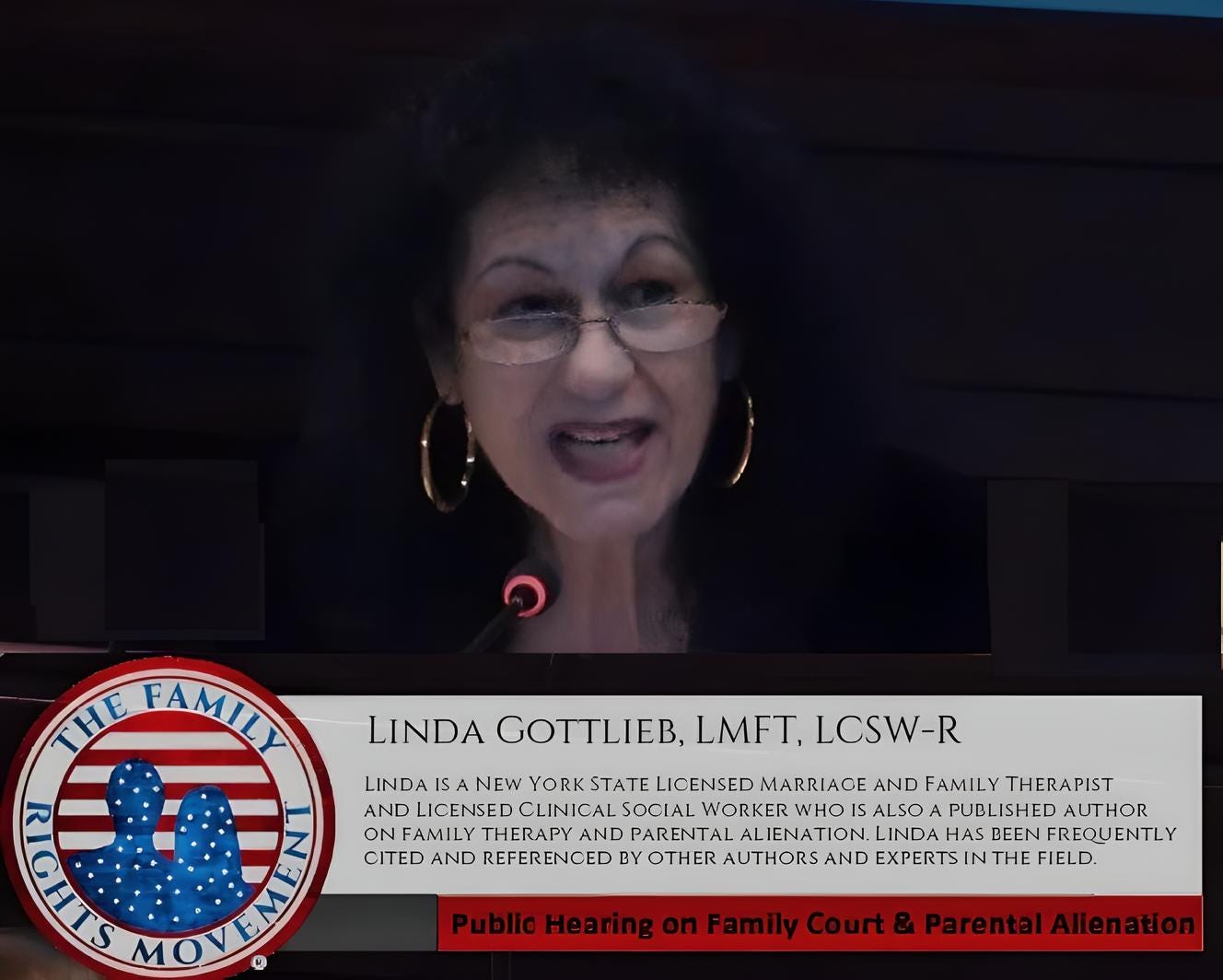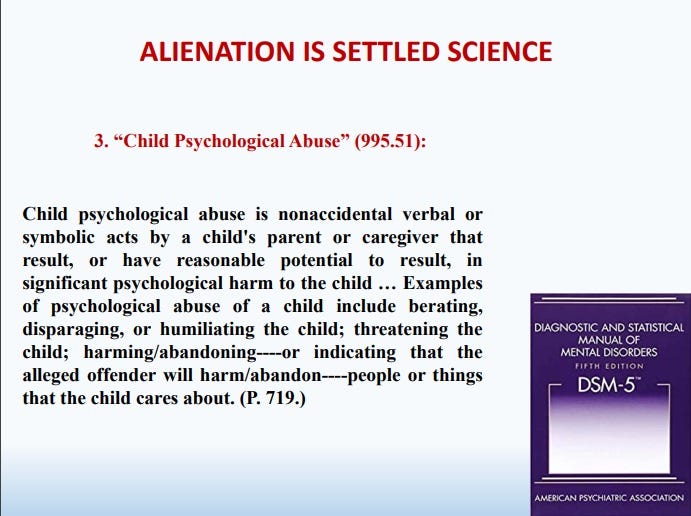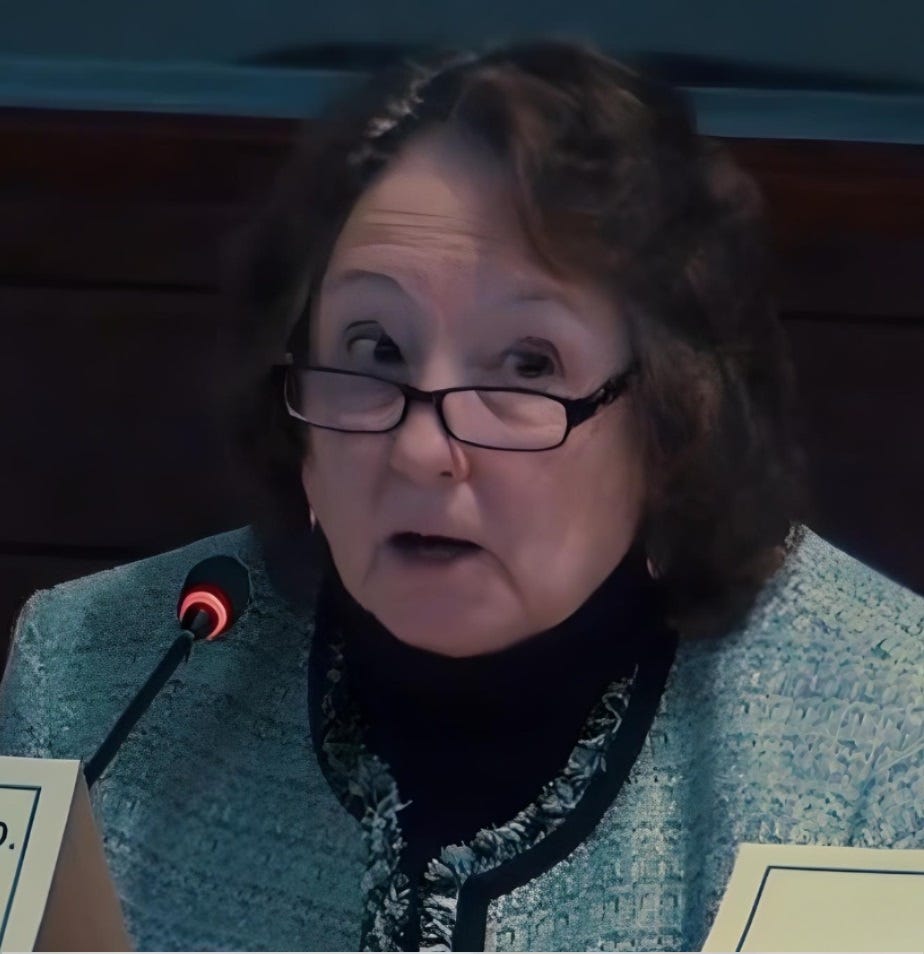More Controversy on Family Court Reunification - Mom Sues Therapy Guru Linda Gottlieb
The PAS Controversy: Unpacking the Reunification Therapy Debates
By Richard Luthmann
We recently reported on a lawsuit filed in Washington State court against Linda J. Gottlieb, LMFT, LCSW. Gottlieb is one of the foremost authorities in Reunification Therapy. Gottlieb and her proponents claim that her work and that of her organization, Turning Points for Families, P.C., are groundbreaking in remedying the effects of Parental Alienation on children and families engaged in protracted, contentious divorce matters.
Lawsuit: More Harm Than Good in Linda Gottlieb's Reunification Practices?
By Richard Luthmann
In a Filed Lawsuit arising from a Family Court matter in Clark County, Washington, Filip Hanik, a software engineer, has taken legal action against his ex-wife, Teresa Hanik, parental alienation consultant Linda J. Gottlieb, and her organization.
Last week, a new lawsuit was filed against Gottlieb and Turning Points. It’s in the Manhattan State Supreme Court in New York this time. Plaintiff Tricia Singer-Romohr is suing “to put an end to the harm to parents, children, and the courts caused by what has become known as the ‘alienation industry,’ in which alienation ‘experts’ are hired to influence the outcome of family court custody cases,” according to the filed court documents.
Background
In Ohio, after her 2012 divorce, Tricia Singer-Romohr was granted custody of her two children. By 2019, her ex-husband sought custody, alleging Parental Alienation, and enlisted Linda Gottlieb as an expert witness.
Singer-Romohr alleges that without meeting her or the children, Gottlieb labeled her a "Parental Alienator." Consequently, a 2021 court order suspended Singer-Romohr's parenting time for 90 days, based on Gottlieb's recommendation, and mandated no contact with the children, directing all parties to participate in Turing Points’ reunification program. In 2022, an Ohio Appeals Court affirmed the ruling.
Singer-Romohr reports paying $6,000 for these services. In February 2021, her children and ex-husband embarked on a four-day "therapeutic vacation" with Turning Points in New York. She claims the services involved therapy sessions that accused her of manipulation. According to her, therapists told the children they would not see their mother again unless they forgave their father.
Singer-Romohr alleges that despite her efforts to comply with Turing Points’ protocols, including writing multiple letters to her children, Gottlieb deemed them unacceptable, extending the no-contact period. Gottlieb continued to find Singer-Romohr non-compliant through January 2023. As a result, the 90-day no-contact period was extended to approximately 900 days, preventing the mother from reuniting with her children.
Deceptive and Unfair Trade Practices
Singer-Romohr’s lawsuit says Gottlieb and Turning Points engage in Deceptive and Unfair Trade Practices violating New York Law.
“Pursuant to Gen. Bus. Law § 349, deceptive acts or practices in the conduct of any business, trade or commerce or in the furnishing of any services in New York shall be declared unlawful…any consumer reviewing the TPFF website would believe that alienation is a ‘scientifically approved disorder’ that is ‘accepted in the psychiatric community,’ that treatment for ‘parental alienation’ is 96% effective, and that if consumers comply with the TPFF Protocol, they will be reunited with their children prior to or soon after a 90-day no-contact period…each of these representations is false and has caused significant harm to children and their preferred parents,” the legal complaint states.
Singer-Romohr is asking the New York courts to shut Linda Gottlieb down permanently.
“Plaintiff respectfully demands judgment as follows:..for preliminary and permanent injunctive relief enjoining Defendants from directly or indirectly offering, advertising, marketing, distributing, disseminating, or otherwise providing any services relating to the treatment of PAS or parental alienation, including, but not limited, the 90-day no-contact period and/or reunification camps,” the complaint requests.
A Discredited Theory?
The complaint states that "Parental Alienation Syndrome" (PAS), the theory underpinning Gottlieb’s practices, faces rejection from the medical community, government bodies, and scientific organizations, according to Singer-Romohr, because of the risks it presents to children and parents.
Dr. Richard Gardner introduced "Parental Alienation Syndrome" (PAS) in the 1980s, claiming abuse allegations in divorce were often false and resulted from one parent's attempt to alienate the child. He believed 90% of custody-dispute children suffered from PAS rather than actual abuse.
Singer-Romohr reports that Gottlieb and other modern-day proponents assert treating PAS requires isolating the child from the non-accused parent and "deprogramming" them with cognitive restructuring techniques. These techniques aim to instill doubt, shame, and guilt in the child about their views of the alienated parent and highlight the inappropriate and selfish exploitation of the child by the alienating parent.
These approaches include "Memorabilia Intervention" and correcting the child's views, often involving forced removal to reunification camps.
Despite these practices, Singer-Romohr says the medical and scientific communities have thoroughly debunked PAS. The DSM-V, the psychiatric diagnostic manual, excludes PAS, and the American Psychological Association has expressed concern over the lack of evidence supporting the syndrome. Furthermore, the World Health Organization and the United Nations have criticized the concept, highlighting its misuse in family law to discredit abuse allegations.
Legislation at both federal and state levels, such as "Kayden's Law" and "Piqui's Law," aims to protect children from these “discredited treatments,” emphasizing the harm they can cause. These laws restrict courts from mandating participation in reunification programs that isolate children from their preferred parents.
In New York, "Kyra’s Law" is under consideration to prioritize child safety in custody decisions, explicitly prohibiting the use of parental alienation claims in cases involving domestic violence or child abuse.
“[T]he sponsor of Kyra’s Law, notes ‘courts often err in awarding child custody or visitation to abusers due to the debunked theory of ‘parental alienation,’ the idea that when parents allege that a child is not safe with the offending parent, they are doing so illegitimately to alienate the child from such parent,’ “the complaint states.
A New York court criticized the PAS concept as "junk science," questioning Gottlieb’s credibility and dismissing her arguments as detached from reality.
“The J.F. v. D.F. court appropriately called into question Gottlieb’s opinions as ‘detach[ed] from reality’ and her analysis as ‘unworthy of credit.’ 2018 N.Y. Slip Op 51829[U] at *72 (“To suggest that any deviation from the expert’s instructions…constitutes alienation shows a detachment from reality that leads this court to conclude that these comments – and much of this expert’s analysis – while perhaps advancing an ideal to which parents should aspire, is unworthy of credit.”),” the papers state.
The J.F. v. D.F. court found Gottlieb’s comments “at times, reached almost the apex of foolishness: she testified that a mother who tells her children that she misses them when they are gone is guilty of alienating conduct and manipulation. If so, every mother in the world needs reprogramming.”
Claims of Deception?
Singer-Romohr says despite widespread rejection by the medical community, government bodies, and legislation, Gottlieb and Turning Points continue to promote PAS as a valid and treatable condition, ignoring the scientific consensus and legal guidelines against it. They market PAS as a legitimate condition, suggesting it can be "cured" through their services.
Gottlieb and her company reportedly promote their services as scientifically valid, promising nearly 100% effectiveness in reuniting children with their "alienated" parents after forced no-contact periods.
“[E]fforts to ‘treat’ parental alienation are not only ineffective but pose serious mental, emotional and physical risks to parents and children subjected to alienation ‘treatment,’ “the lawsuit alleges.
The suit aims to prevent Gottlieb and Turning Points for Families from further claiming that their services can scientifically and effectively treat "Parental Alienation," seeking to end Gottlieb’s allegedly misleading representations to the public and courts.
The Turning Points website asserts that "alienation is settled science," recognized in the scientific community. Singer-Romohr says this claim, repeated across several Turning Points publications, is contradicted by the American Psychiatric Association's exclusion of parental alienation from the DSM-V. Furthermore, Singer-Romohr says Turning Points falsely implies that PAS is recognized in the DSM-V, aiming to deceive consumers, including those involved in family court proceedings.
Additionally, Singer-Romohr says Turning Points' protocol misleadingly promotes a 90-day no-contact period between the child and the preferred parent as part of the "treatment" for parental alienation. Despite promises of lifting the no-contact period "sooner than 90 days," former clients like Singer-Romohr report extensions lasting months or years based on arbitrary and unreasonable conditions set by Turning Points.
Singer-Romohr also reports that Gottlieb and Turning Points boast a success rate of over 96% in reuniting children with their allegedly alienated parents. Critics question this figure, viewing it as a misleading tactic to validate PAS as a legitimate and treatable condition. According to allegations, these claims have significantly harmed children and parents, including Singer-Romohr, who have undergone these practices.
Is Parental Alienation “Settled Science”?
Linda Gottlieb believes that Parental Alienation is settled science. Many experts agree with her.
The Parental Alienation Study Group, Inc. (PASG) is a nonprofit international organization of mental health professionals, legal professionals, targeted parents and grandparents, and child and family advocates who are interested in the study of parental alienation. The PASG website says that while the DSM-V does not explicitly mention Parental Alienation, it is implicit:
What is in DSM-5 about parental alienation?
In the DSM-5 (published by the American Psychiatric Association in 2013), five diagnoses describe different aspects of parental alienation:
Parent–child relational problem (p. 715)
A new diagnosis in DSM-5: child affected by parental relationship distress (p. 716)
Another new diagnosis in DSM-5: child psychological abuse (p. 719)
Delusional symptoms in partner of individual with delusional disorder (p. 122), formerly called folie à deux
Factitious disorder imposed on another (p. 325), formerly called Münchausen syndrome by proxy
Bernet, W., Wamboldt, M.Z., Narrow, W. (2016). Child Affected by Parental Relationship Distress. Journal of the American Academy of Child & Adolescent Psychiatry 55:571–579.
Global Action for Research Integrity in Parental Alienation (GARI-PA) is a Non-Governmental Organization (NGO) nonprofit established by professionals, researchers, students, and civil society from all over the world interested in the research integrity in parental alienation and child abuse. GARI-PA recently released a Statement of the Global Action for Research Integrity in Parental Alienation, a highly specialized study questioning the research integrity of the opponents of parental alienation. They claim:
The Statement analyzes the impact of ethically questionable conducts of "professionals” and “researchers" who, by adulterating the sources on the subject, they eliminate the exclusion or security criteria to make it seem that the parental alienation syndrome or similar concepts defend pedophilia. They also wrongly claim that the parental alienation symptoms are the same as those of sexual abuse cases.
Using crafts and fallacy, those "professionals or researchers" have managed to deceive prestigious institutions around the world, they have published fraudulent works supported by their publishing houses, provoking great social damage, exposing thousands of children to this kind of child abuse called parental alienation, and violating their human rights.
Jennifer J. Harman, Ph.D., is an Associate Professor of Psychology at Colorado State University in the Applied Social & Health Psychology program. She received her doctorate in Social Psychology from the University of Connecticut in 2005 and specializes in studying intimate relationships. Harman also has two master's degrees in psychological counseling from Teacher's College, Columbia University. Before entering academia, she served as a family and substance abuse counselor for several years.
Dr. Harman and her colleagues reviewed Linda Gottlieb’s Turning Points program and published their findings. See Harman, J. J., Saunders, L., & Afifi, T. (2021). Evaluation of the Turning Points for Families (TPFF) program for severely alienated children. Journal of Family Therapy, which made these findings:
The Turning Points for Families (TPFF) therapeutic intervention program for severely alienated children and their alienated parent was evaluated to determine whether it was safe, did not cause harm, and led to positive changes in the alienated parent–alienated child relationship. Court orders and video recordings of the 4-day intervention were reviewed for indications of improvements over the course of the intervention in relational communication, social support and communal coping, which refers to the family membersjointly ‘owning’ a problem and proactively taking responsibility for it together. Improvements in the parent child relationships were noted, and the TPFF helped to improve family members’ communal coping scores. Participation did not lead to negative changes on any measure. This preliminary evidence indicatesthat TPFF,similar to other therapeutic structural interventions, is a safe and effective treatment option forseverely alienated children.
Orwellian, Abusive, Child Trafficking
There are ample detractors for every one of Linda Gottlieb’s supporters.
Dr. Bandy X. Lee, M.D., M.Div., is a forensic psychiatrist, violence expert, President of the World Mental Health Coalition (worldmhc.org), and a New York Times bestselling author.
Dr. Lee’s scholarly work includes writing a comprehensive textbook on violence. She is a specialist in public health approaches to violence prevention who consulted with the World Health Organization and initiated reforms at New York's Rikers Island Correctional Facility. She helped draft the United Nations chapter on "Violence Against Children," led a project group for the World Health Organization's Violence Prevention Alliance, and contributed to prison reform in the United States and worldwide. She taught at Yale School of Medicine and Yale Law School from 2003 through 2020.
In a recent article Beware Family Court Doublethink and Newspeak, Dr. Lee challenges Reunification Camps as “Orwellian”:
Family Court Doublethink: Children who Resist Their Abuser Need ‘Reunification’
The mechanism for switching custody is “reunification”. Any healthy child, naturally, will resist or reject a parent who physically, psychologically, or sexually abuses them. In the upside-down world of Family Courts, the stronger the resistance, the more evidence it is of the other parent’s “alienation”. Therefore, the children need to be separated from the “alienating” parent and be “reunified” with the parent they are resisting. Recent Insider investigations into “reunification” camps such as Family Bridges or Turning Points for Families exposed that, since 2000, Family Court judges sent at least six hundred children to “reunification” programs that enforced temporary exile from their bonded, trusted, and protective parent to “reunify” them with nonbonded, rejected, and dangerous parent. Thug-like transport agents may seize children by force, essentially kidnapping them. While the programs suggested a “no-contact period” of ninety days with the trusted parent, this term was routinely extended to years — if not until the child “aged out” at eighteen. As is well-established in the field of child psychiatry, such abrupt separation from the primary caregiving parent, and extraction from their stable home, is inevitably traumatic. Indeed, it is perhaps one of the most traumatic experiences a child could endure — for even when there is abuse, the presence of trusted primary supports can be mitigating, but here it is the first thing to be stripped away. In the context of being isolated from the trusted parent, the next most essential component for healing is the ability to tell the truth about what happened, and this is taken away, also. Like the rest of the “alienation” industry, “reunification” programs pretend to have a scientific basis for effectiveness, but their every aspect is antiscientific and antithetical to all therapeutic principles, and would never meet the standards for admission into any courtroom — except in Family Court, where this is a very requirement.
Using classic “brainwashing” techniques as described in Robert Jay Lifton’s Thought Reform and the Psychology of Totalism, “reunification” program participants are typically verbally abused, physically deprived, and psychologically terrorized with further torture if they resist. Unsurprisingly, children in the program deteriorate acutely, becoming depressed and suicidal, as several former participants disclosed. One thirteen-year-old girl got so distressed, that she banged on a hotel wall and screamed for help; others calling the police got her to a psychiatric hospital, but the one thing she cried out for — to see her mother — a court order prohibited. Many others were similarly psychiatrically hospitalized, according to Insider investigations. In addition to camps, “reunification” therapists, counselors, and mediation specialists are proliferating everywhere (Family Bridges charged 25,000 dollars for the first four days in one case, and a Family Court-mandated “therapist” with barely a non-social work master’s degree once charged 28,000 dollars for thirty sessions).
The Foundation for Child Victims of the Family Courts (FCVFC) is a 501(c)3 nonprofit devoted to helping protect parents and children endangered by the family court system in the United States.

Jill Jones Soderman, FCVFC’s Founder and Executive Director, views the Family Court as a corrupt organization, with the rot emanating directly from the theories of Richard Gardner, MD. For FCVFC, Parental Alienation has spawned a Family Court system engaged in racketeering and child trafficking.
The organization uses legal means to challenge what they believe to be the false flag of Parental Alienation, firmly planted in the justice system. Earlier this month, FCVFC filed a Writ of Certiorari with the U.S. Supreme Court challenging Reunification Therapy as an Unconstitutional Practice. The filing said:
“ ‘[R]eunification therapy’ used as a covert means of changing custody…is, by its very nature, a violation of the basic rights of children. It is a coercive and abusive use of psychological techniques to sever the bond between a custodial parent and his (or her) children. This cannot pass constitutional muster.”
Citing U.S. Supreme Court precedent, including Santosky v. Kramer and Troxel v. Granville, FCVFC claims the constitutional rights of a custodial parent and their children are violated under the Due Process clause of the 14th Amendment when a Family Court order forces the children to participate in a coercive program designed to isolate them from the custodial parent and to “reunify” them with a non-custodial parent they fear and do not want to live with.
The FCVFC denounces Gottlieb’s work in the strongest of terms, calling it “torture” and claiming it destroys families:
“The FCVFC views the practice of ‘Reunification Therapy’ as not only a dangerous fraud money-making scam, but a form of child trafficking. We view the connection between the court transfer of children into the hands of abusers as a unilateral, well-organized practice of child trafficking, with connections in every case to some form of racketeering.”
“For this reason we write up these cases for FBI referral and referral to the Office of the US attorney general. The chain of corruption requires intensive forensic investigation.”
“Devastation” cannot begin to describe the dictatorial, disrespectful, overpowering nature of the assault on children, but the term “broken” children does apply. To suggest that this system of adding trauma upon trauma is anti-therapeutic, anti-democratic, and in violation of the UN treaties defining the rights of the child.”
A Concerted Assault on Parental Alienation?
Some say to follow the money, pointing to a concerted backlash against Parental Alienation using legislative means.
Tina Swithin is the author of Divorcing a Narcissist, the Founder of One Mom’s Battle, and a member of the National Safe Parents Coalition. She is a tireless advocate and had much to celebrate in March 2022 when she wrote:
This month was monumental in the world of family court reform and domestic violence advocacy. Not only was the Violence Against Women Act (VAWA) reauthorized and signed by President Joe Biden after six long years of bi-partisan negotiation, it included an important new provision: Kayden’s Law. The adoption of Kayden’s Law in VAWA marks the first time in history that the federal government has so plainly acknowledged the need for improved child safety measures in the private family court system all across the United States.
Danielle Pollack is the Policy Manager at the National Family Violence Law Center at G.W. Law in Washington, D.C., and the originator of Kayden’s Law. She collaborates closely with state and federal lawmakers, partner organizations, advocates, and families to create comprehensive child-centric policy reform and provide public education on family courts. Her work focuses on advancing systemic, empirically-supported family court reforms for improved outcomes for children and their safe parents.
Some criticize the motives behind the adoption of Kayden’s Law in VAWA. Maureen Martowska is a retired attorney and member of the Connecticut Shared Parenting Council and the Connecticut chapter of the National Parents Organization. She has concerns about the potential misuse of "coercive control" (a form of domestic violence) in custody battles, primarily due to the federal government's incentivized funding for states that incorporate "Kayden's Law" from the VAWA.
Martowska says the reauthorization of VAWA in 2022 included substantial grants such as the STOP (Services, Training Officers, and Prosecutors) Violence Against Women Formula Grant Program and the Sexual Assault Services Program (SASP).
But Martowska warns some state organizations are adopting "a gender-based approach where they feel once an abuser always an abuser and that men are by nature more aggressive. Importantly, they know that Parental Alienation is the obstacle to winning their case. Therefore, they have adopted the narrative that P.A. is junk science and coercive control should be interpreted broadly."
Notably, under Kayden's Law, any domestic violence accusation prevents the accused from using it as a defense and restricts the introduction of P.A. evidence. States adopting this law into their regulations stand to receive millions in federal funding.
Center for Judicial Excellence Faces Scrutiny Over "Child Safety First" and Congressional Briefing
Analysts from PASG and GARI-PA claim the CJE's report opposing Parental Alienation might have biases, citing over 50 questionable references.
"Right now, there is a nationwide push by Attorney Danielle Pollack and Dr. Joan Meier of the National Family Violence Law Center at George Washington University," says Martowska. Their primary objective is channeling these federal funds to educate judiciary members, court staff, and court vendors about domestic violence with a ‘gender-bent’ and refuting Parental Alienation as ‘junk science,’ she says.
Critics suggest that the Family Court system, by neglecting Parental Alienation, could be financially benefiting themselves at the expense of families.
A Concerted Assault on Reunification?
Joan T. Kloth-Zanard, GAL, RSS, ABI & L.C., is an expert in the fields of Parental Alienation, psychological abuse, intervention strategies, and techniques and strategies for moving forward and rebuilding a life after a traumatic event or series of traumatic events. Based in Connecticut, she is the Director of Parental Alienation Support & Intervention (PASI), a 501(c)(3) international nonprofit organization that Prevents, Intervenes, and Supports Victims of Parental Alienation. She claims the attacks on reunification are disingenuous and part of a larger strategy.
" The process of reunification is not causing the problem. Just like it is mandatory to go to school, it is not the process causing the child to refuse to attend. In situation of difficult custody transfers, it is directly and proportionately caused by people like Tina Swithin, Danielle Pollack, people who they enlist, and the alienators They stand outside of the transfer area triggering psychological abuse of the children, by gaslighting and inciting the children to believe they are not safe,” Kloth-Zanard said.
Moreover, Kloth-Zanard claims there is “no proof” of panic attacks related to reunification.
“That only happens when someone like…Tina Swithin bring[s] in a group of people to picket the process or harass the children and targeted parent. In fact, in every single case where the reunification has failed, which is maybe a couple, it is because the alienating parent impedes court orders or Tina Swithin kidnapped or harassed or impeded. If they had stayed out, the children would now have a happy, healthy relationship. Look at the few failed cases and see that the pattern directly relates to this. They are causing the panic attacks so that they can make false claims,” Kloth-Zanard said.
Kloth-Zanard asserts that Swithin, Pollack, their associates, and the alienating parent deliberately disrupt custody transfers to support their narrative that intensive reunification therapy harms children. They stage events to incite anger and resistance in the children, misrepresenting themselves as protectors while inflicting psychological harm. However, in their absence, custody exchanges occur smoothly, showing the chaos in Swithin's videos is fabricated to advance her biased agenda.
“Yes, she is causing the transfer of custody exchanges to be toxic and dangerous. Yes, she is manipulating the scene to create the scenario she wants the public to see by creating a crowd response that is what triggers the children to act out to create her false narrative. Yes, she is inciting the children to act badly. And now Tina Swithin is preying on minor children on the Internet to contact her. This is predatory [solitication of] minors on the Internet,” Kloth-Zanard claims.
Kloth-Zanard claims this is “stochastic terrorism,” and the courts should include stronger language in their orders about anyone who shows up to impede obtaining appropriate mental health help for the children and their targeted parent.
She also alleges Tina Swithin omits crucial details about the cases she discusses, including the reasons behind the sensational custody exchanges she portrays.
“She exploits the sensational aspects of exchanges but never acknowledges the mountains of evidence of child abuse on the part of the alienating parent. She isn’t telling you WHY judges have to remove children,” Kloth-Zanard provided several filed court documents she says support her claims, including this publicly available case from Delaware.
Will Tricia Singer-Romohr’s Case Shut Linda Gotlieb Down?
Tricia Singer-Romohr's lawsuit against Linda Gottlieb and Turning Points for Families presents a formidable challenge to Gottlieb's practices and the broader "alienation industry." Given the extensive allegations and documentation of deceptive and unfair trade practices and the significant harm claimed to children and parents, this case could have profound implications for Gottlieb and her organization.
This legal action seeks explicitly to prohibit Gottlieb and Turning Points from offering services related to the treatment of Parental Alienation Syndrome (PAS) or Parental Alienation, highlighting a concerted effort to dismantle what the lawsuit terms as “misleading” and “potentially harmful” practices.
But are they? That will be a difficult question for the Manhattan court.
The backdrop of scientific and medical “consensus” rejecting PAS as a legitimate diagnosis, coupled with legislation aimed at protecting children from such discredited treatments, bolsters Singer-Romohr's case. High-profile criticisms and detailed PAS's risks in the lawsuit align with a growing legislative and societal push against these practices.
However, proponents of PAS and Gottlieb’s Reunification Therapy appear similarly credentialed, with backgrounds in science, law, and practical experience. The Court cannot ignore these claims of clear clinical bases for PAS in the DSM-V and empirical research.
In this charged atmosphere, Singer-Romohr's lawsuit represents more than a personal quest for justice; it is a focal point in the ongoing struggle over how Family Courts address allegations of parental alienation. Whether it will definitively "shut down" Linda Gottlieb remains uncertain. Still, it highlights the controversial practices associated with reunification therapy and the legal and ethical questions they raise.
















It's equally shocking, troubling and telling that the "family" court reform efforts in this country have been, and continue to be, stuck and not progressed in 20+ years over the same pointless and circular arguments regarding "parental alienation" and "what it is."
If anyone believes parents are not encouraged to tell lies in court regarding abuse, and that many parents keep children from seeing their other parent and family members for no valid reason, they're deaf, dumb, blind and delusional. This is engrained in our society and the Divorce Industry as a norm and standard operating procedure.
This is also why shared and equal parenting, absent a finding of abuse in a court of law, must become the norm in our country. And one more and more states are adopting - with very positive results.
Vinita Mehta Ph.D., Ed.M.
Parental alienation is a form of child abuse that we are only beginning to recognize. Technically speaking, it’s when a child aligns with one parent and rejects its other parent for reasons that are not warranted. According to The Parental Alienation Study Group, at least 3.9 million children in the United States are “moderately to severely” alienated from a parent. Put another way, there are three times as many children in the United States who are alienated from a parent than there are children with autism.
This is, obviously, a staggering number. But what are the effects of parental alienation on children? This was the question of a study conducted by psychologists Caitlin Bentley and Mandy Matthewson of the University of Tasmania.
In order to pursue this inquiry, they recruited adult participants who had a history of parental alienation. From there, they conducted semi-structured interviews, asking a series of exploratory questions about the alienation. Their narratives were then analyzed for themes.
The results were striking. Seven themes were identified, revealing the breadth and depth of the effects of alienation well into adulthood. A selective overview of the study’s findings is provided below.
Alienating Behavior and Impact
Adult children reported a multitude of alienating behaviors that damaged their relationship with the Target Parent and their own well-being. This theme broke down into seven sub-themes:
Abuse and control. Participants were emotionally and physically abused by the Alienating Parent. For example, they were made to feel fear or guilt when they didn’t comply with the Alienating Parent’s view of the Target Parent.
Denigration of the targeted parent—to the point where it damaged the child’s bond with the Target Parent.
Adultification—in which their parent inappropriately disclosed information and sought support during custody disputes.
Disrupting alienated adult child and targeted parent relationship. The bond between children and the Target Parent was damaged. Some moved to different states or overseas, making a relationship or even communication with the Target Parent difficult. Others were told that the Target Parent didn’t love them.
Perceptions of the Alienating Parent’s characteristics—including self-absorption, criticalness, and lacking in empathy and insight into how their behavior impacts others—even when confronted by their child.
Neglect. Basic needs and safety were disregarded.
Alienated adult child experience suppressed. Participants pushed down their thoughts, emotions, and memories, particularly regarding the Target Parent.
Mental Health
Adult children reported mental health struggles both as children and adults. This theme consisted of three sub-themes:
Mental health difficulties. All of the participants experienced mental health issues, ranging from anxiety and PTSD to suicidal ideation, which they traced to their Alienating Parent’s abuse.
Self-esteem. Participants reported having low self-esteem and low confidence in themselves and their abilities.
Substance use. Alienated adult children disclosed using alcohol and drugs, for some at an early age, in order to cope with the abuse.
Relationship Difficulties
Participants described having difficulties across friendships and romantic relationships. Five sub-themes surfaced:
Difficulty relating to peers. Participants felt different from and unable to confide their experience of parental alienation with other children.
Fear of loss. Most participants expressed fears of losing a relationship, causing them to avoid conflicts in relationships or even entering relationships.
Difficulty trusting. Participants had difficulty believing that someone would support them, and thus they hid their difficulties from others.
Dysfunctional and abusive relationships. Adult children often chose partners that were as abusive as their Alienating Parent, sometimes in a desperate effort to feel loved. Others stayed in unhealthy partnerships to avoid divorce at all costs.
Struggle to maintain healthy relationships. Participants felt that a lack of positive role models, mental health problems, and poor relationship skills made relationships challenging.
Learning and Development
Participants believed that the alienation stunted their development and capacity to learn. Two sub-themes emerged:
Identity. Being told that the Target Parent was bad, children were conscious of the ways in which they were like the Target Parent and felt shame about it.
Education and employment. Most participants had difficulty with learning and focusing on school, which altered the course of their lives. They felt blocked from fulfilling their academic potential at school because the Alienating Parent’s needs came before their own.
Grief and Loss
Participants felt a pervasive sense of grief and loss, which was tied to their experience of alienation. Five sub-themes were found:
Anger and emotional pain—largely for the “injustice” and “the mess” their parents made.
Feeling they missed out—on a childhood, including learning basic skills (e.g., cooking) and an early loss of innocence.
Guilt. Most participants felt the Alienating Parent made them feel guilty. They also felt guilty about the ways they treated the Target Parent, even though they knew they weren’t to blame.
Grieving the loss of the relationship with the Targeted Parent. One participant shared: “Most of my childhood memories are just, 'Oh God, even up until the age of 40, I just want my dad, I just want my dad.'”
Disappointment with their relationship with the Target Parent. Some participants felt the Target Parent had moved forward with a new relationship or family, gave up on them too soon, or was disinterested in them.
Disconnection and Dysfunction
Participants described “segregated” family lives. Two sub-themes were identified.
Disconnection. Participants felt they had abnormal family lives, with isolated childhoods and limited or irregular contact with extended family. Some had cut off contact with the Alienating Parent.
Intergenerational transmission of trauma. Participants observed that their parents had dysfunctional relationships with their own parents, and that the dysfunctional behavior had been learned.
Coping and Healing
Participants shared how they coped with alienation, giving rise to four sub-themes:
Coping and resilience. While many participants coped by themselves, others leaned on the Target Parent. Some developed a bond with a caring and protective person.
Reunification attempts. Many participants tried to reunite with their Target Parent. For some, this was healing, while others were ambivalent about reconnecting.
The healing process. Participants tried to make sense of their pasts, with some seeking therapy. Some found that identifying their experience as parental alienation was healing: “As I got a bit older, I decided to go see a therapist and that started to put things in place, and break the normalization... You start to realize that what you’ve gone through was abuse.”
Parental alienation awareness. Participants felt it was important to raise awareness about parental alienation, and how they might have benefited from intervention.
References
Caitlin Bentley & Mandy Matthewson (2020): The Not-Forgotten Child: Alienated Adult Children’s Experience of Parental Alienation, The American Journal of Family Therapy, DOI: 10.1080/01926187.2020.1775531